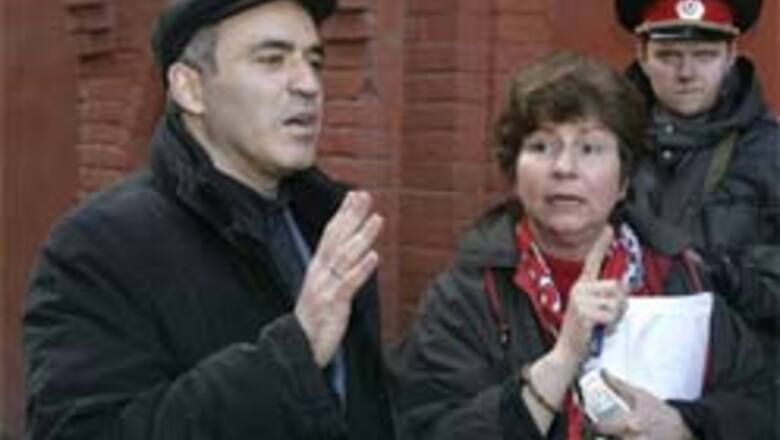
views
Moscow: Hundreds of demonstrators defied police on Saturday as they tried to stage an outlawed protest march against President Vladimir Putin's government, leading to sporadic clashes across the city and more than 150 arrests.
A coalition of opposition groups had organised the so-called "Dissenters March" to protest the government's economic and social policies, as well as a series of Kremlin actions that critics say has stripped Russians of many political rights.
Garry Kasparov, the former world chess champion and a leader of the opposition, was one of about 170 protesters who police said were detained. A court was hearing his case on Saturday evening.
Witnesses said he was seized as he tried to lead a small group of demonstrators through lines of hundreds of police who ringed the site of the planned rally, at Moscow's landmark Pushkin Square.
Later, officers charged into a crowd of about 200 demonstrators outside the police precinct where Kasparov was being held, beating protesters with nightsticks and fists.
During a break in the court hearing, Kasparov said that Russia is descending into authoritarianism. "Today is an important demonstration of the degeneration of Putin's regime," he said.
Kasparov and his allies mustered, by their own reckoning, about 2,000 people - far fewer than the 30,000 people who patronise the Pushkin Square McDonald's on an average day.
But some protesters said they were not discouraged by the small turnout, or intimidated by the overwhelming force used against them. A similar march is planned on Sunday for St Petersburg, despite a ban by authorities.
Andrei Illarionov, a former economic adviser to Putin who has become a Kremlin critic, pointed out that in 1968 only six protesters appeared in Red Square to protest the Soviet invasion of Czechoslavakia.
"This is a crime against the Russian constitution," he added. "This country is not free anymore and the main criminal in Russia right now is the authorities."
It was not clear how the Russian public reacted to the protests: many probably did not realise they occurred. None of the nation's main television networks carried reports on the demonstrations as they were happening.
PAGE_BREAK
Later, the government-controlled Channel 1 showed protesters walking beside police, but did not broadcast scenes of the clashes or detentions. NTV briefly showed Kasaparov being taken away in a police bus.
About 100 of those detained at Pushkin Square were members of the ultranationalist national Bolshevik Party, party spokesman Alexander Averi said. But he said Eduard Limonov, the novelist and provocateur who heads the party, evaded a detention attempt.
City officials had turned down organisers' request for permission to use Pushkin Square, a traditional site for protests. Instead, they approved the use of Turgenev Square, about two kilometers (1.2 miles) east, farther from the city's commercial and cultural hub.
Organisers, however, refused to cancel plans for the Pushkin Square rally and protesters started to arrive before 11 AM local time. Police started seizing them a few at a time.
A 23-year-old woman, who gave her name only as Maria, said she and her husband Andrei were coming out of the subway when police grabbed him.
"We didn't do anything," said Maria, tears rolling down her face as she watched Andrei being hustled into a police truck. "We just wanted to see what would happen."
Viktor Vinokourov, a 67-year-old retiree, watched the detentions from a nearby sidewalk, holding a hand-scrawled sign declaring: "I Don't Agree." A young man in a leather coat, apparently a plainclothes security officer, snatched it out of his hands.
Around noon, a group of several hundred protesters headed away from the square, marching past startled motorists toward the sanctioned demonstration site. They shouted "Putin get out!" and "We need a new Russia!"
As they walked arm-in-arm down a main thoroughfare, a police cordon blocked their path. Some in the crowd ran forward and police charged, their truncheons flailing.
A Japanese journalist received a gash on the head, and was treated by a policeman in a riot helmet. Eventually the crowd melted into side streets, and many joined about a thousand demonstrators at the authorised rally site.
Hundreds of police and troops surrounded the square, but they let demonstrators in after checking them for weapons.
In a speech there, Mikhail Kasyanov, Putin's first prime minister but now a leading opponent, denounced the arrests and beatings.
PAGE_BREAK
"Everyone should ask the question: what is happening with our authorities - are they still sane, or have they gone mad?" he said, as the crowd chanted "shame on the government."
Moscow Mayor Yuri Luzhkov, who observed the march, said authorities were only seeking to maintain order, not interfere with the exercise of political rights.
"We live in a democratic country, a free country, and we give the possibility to everybody to express their agreement or disagreement," he added, in remarks carried on Russia's Channel 1 television.
In recent months, three previous demonstrations - all called Dissenters' Marches - have been broken up harshly or smothered under a massive police presence in Moscow, St Petersburg and Nizhny Novgorod.
This weekend's marches are being closely watched at home and abroad as a barometer of how much of a threat, if any, opposition forces pose to the Kremlin. Russia holds parliamentary elections in December and the presidential vote next spring.
Since Putin took office in 2000, the Russian government has created an obedient parliament, abolished direct gubernatorial elections and tightened restrictions on civic groups. Kremlin critics are now rarely heard on major TV networks.
The elections are expected to eliminate most of the remaining opposition figures from the parliament. Most political analysts in Russia expect Putin to choose a successor and throw the weight of government behind his hand-picked candidate's election.















Comments
0 comment